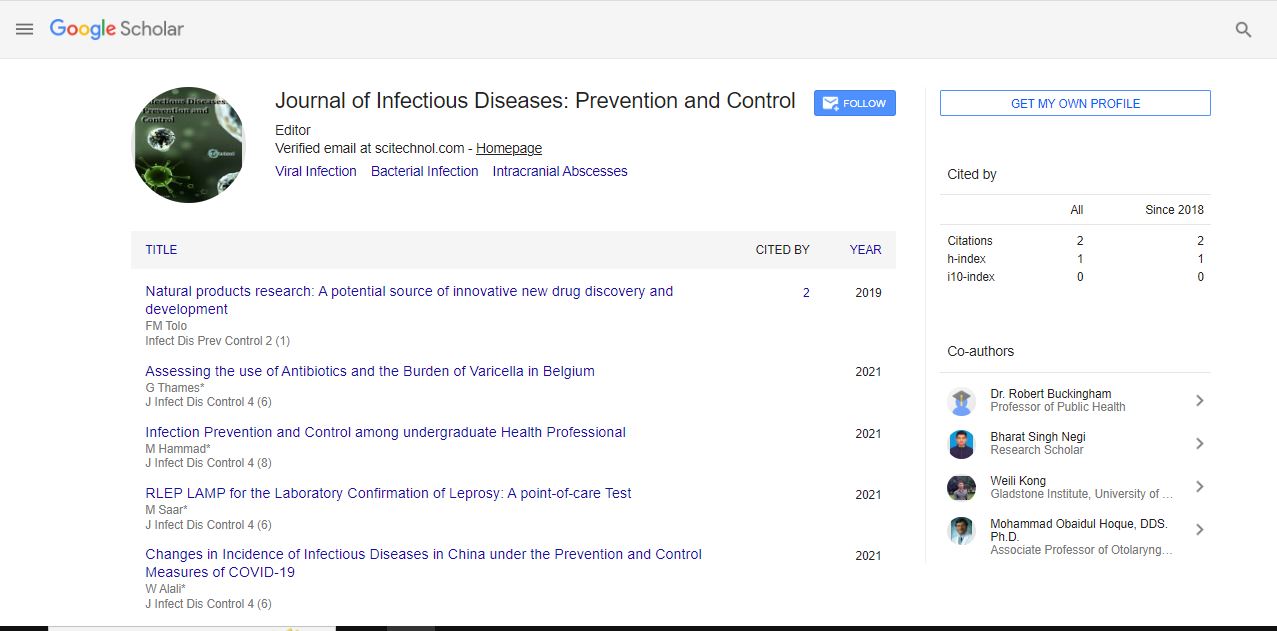Perspective, Vol: 6 Issue: 2
Importance of Parasitology from Host Evolution to Balancing Ecosystem
Walter Van*
1Department of Orthopaedic Surgery, St. Anna Hospital, Bogardeind 2, Geldrop, The Netherlands
*Corresponding Author: Walter Van,
Department of Orthopaedic
Surgery, St. Anna Hospital, Bogardeind 2, Geldrop, The Netherlands
E-mail: vanwalter24@gmail. com
Received date: 27 May, 2023, Manuscript No. IDPC-23-105492;
Editor assigned date: 29 May, 2023, Pre QC No. IDPC -23-105492(PQ);
Reviewed date: 15 June, 2023, QC No. IDPC -23-105492;
Revised date: 23 June, 2023, Manuscript No. IDPC -23-105492(R);
Published date: 30 June, 2023, DOI: 10.36648/idpc.5.2.136
Citation: Van W (2023) Importance of Parasitology from Host Evolution to Balancing Ecosystem. Infect Dis Prev Control 6:2.
Abstract
Parasitology is an important field that involves studying parasites and how they interact with their hosts in intricate ways. Parasites, a diverse group of organisms, have evolved intricate strategies to exploit and survive within their hosts. Understanding the complex relationships between parasites and their hosts is not only understanding the relationship between parasites and their hosts is essential not only for maintaining the well-being of humans and animals but also for understanding the complexities of the natural world.. This article delves into the intriguing world of Parasite Chronicles, exploring the science behind parasitology and the host interactions that govern these unique relationships
Description
Parasitology is an important field that involves studying parasites and how they interact with their hosts in intricate ways. Parasites, a diverse group of organisms, have evolved intricate strategies to exploit and survive within their hosts. Understanding the complex relationships between parasites and their hosts is not only understanding the relationship between parasites and their hosts is essential not only for maintaining the well-being of humans and animals but also for understanding the complexities of the natural world.. This article delves into the intriguing world of Parasite Chronicles, exploring the science behind parasitology and the host interactions that govern these unique relationships.
Parasites are organisms that live on or within another living organism, known as the host, to derive their sustenance and complete their life cycle. They can belong to various taxonomic groups, including protozoa, helminths (worms), and arthropods. Parasites come in different forms and sizes, ranging from microscopic protozoans to sizable tapeworms. They can infect plants, animals, and even other parasites.
The coevolutionary dance
Parasites and their hosts are engaged in a perpetual coevolutionary dance. As parasites adjust to survive inside their hosts, the hosts also develop mechanisms to resist or the parasitic infections. This leads both to create more advanced strategies, ultimately influencing the evolutionary path of both the parasites and their hosts.
Host manipulation: The puppet masters
One of the most astonishing aspects of parasitology is the ability of some parasites to change the behavior of their hosts for their own benefit.
This phenomenon, known as host manipulation, occurs when parasites alter the behavior of their hosts to enhance their transmission and survival. For instance, a parasitic worm may influence the behavior of an ant to climb to the top of a blade of grass before being consumed by a grazing mammal, thereby completing its life cycle. Similarly, the Toxoplasma gondii parasite can alter the behavior of rodents, making them less fearful of predators and increasing the likelihood of their predation, which allows the parasite to infect its definitive host, typically a cat.
Zoonotic diseases: Bridging the gap
Many parasites have the ability to infect multiple host species, including humans. These are known as zoonotic parasites, and they can pose significant health risks to both animals and humans. Zoonotic diseases, such as malaria, rabies, and Lyme disease, are caused by parasitic organisms that jump between different host species. Understanding the transmission dynamics and host interactions of zoonotic parasites is vital for preventing outbreaks and safeguarding public health.
Parasites and medical research
The study of parasites has significant implications for medical research and public health. Parasites are responsible for numerous debilitating diseases worldwide, particularly in tropical and subtropical regions. Malaria, caused by Plasmodium parasites transmitted through the bites of infected mosquitoes, which kills thousands of people each year. Research in parasitology has led to the development of treatments and preventive measures, such as antiparasitic drugs and vector control strategies, aimed at reducing the burden of parasitic infections.
Conservation and ecological impact
Beyond human health, parasites play an essential role in ecological systems. They can influence the behavior and population dynamics of their hosts, impacting entire ecosystems. When parasites infect keystone species, their effects can cascade through the food web, altering the balance of entire habitats. Understanding these interactions is crucial for conservation efforts and maintaining biodiversity.
Parasitology is a captivating field that is heplful for the researchers to study about the intricate intricate relationships between parasites and their hosts. From evolutionary battles to host manipulation, the science of parasitology offers a wealth of insights into the functioning of natural ecosystems. By studying parasites, researchers can develop effective strategies to combat parasitic diseases, protect public health, and maintain the delicate balance of our planet's diverse ecosystems.
 Spanish
Spanish  Chinese
Chinese  Russian
Russian  German
German  French
French  Japanese
Japanese  Portuguese
Portuguese  Hindi
Hindi 